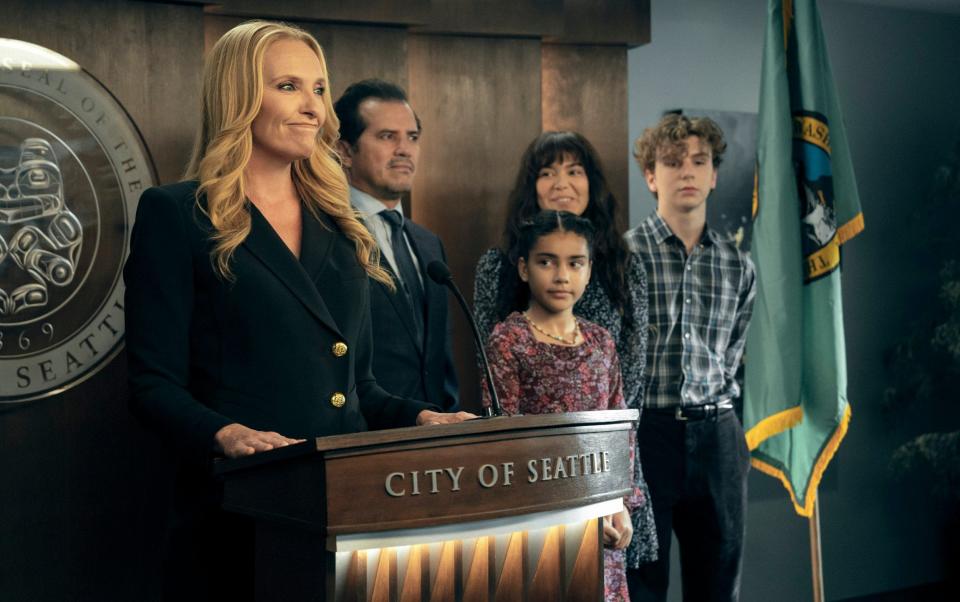Rushed Scripts, Confusion & Blacklisting Threats: How The UK Is Responding To The Writers Strike

The impact of the momentous WGA strike is still being digested by the UK industry with professionals we’ve spoken to in the past 24 hours expressing a combination of solidarity, uncertainty, and the view that the strike will be less problematic than other macro issues affecting their businesses.
The Writers Guild of Great Britain was yesterday unequivocal in its support for the WGA strike, reminding members that they will be removed from the U.S. Guild if they take on work within a WGA jurisdiction during the strike. It published detailed guidelines and a Q&A. The WGA’s own rules during the strike are here.
More from Deadline
“We continue to show our solidarity with our sister union and their members in the U.S. as they embark on industrial action to secure fair pay, decent working conditions and to gain their rightful share in the future financial successes of their work,” said WGGB Chair Lisa Holdsworth.
The full ramifications of the walkout will only become clear with time, but for now, writers, producers, and agents are gathering intelligence and relying on contingency plans to keep major productions on track. Some were critical of how it has got to this point, with one senior studio executive arguing that the industry had “sleep walked” into a strike and there was not enough urgency to agree a resolution.
Productions Filming In UK & Beyond
There are a large number of U.S.-UK co-productions currently in the works in the UK, which in theory could be derailed by strike action.
Amazon’s The Lord of the Rings: The Rings of Power and Disney+’s The Acolyte are among the major U.S. dramas currently shooting in the UK. If scripts for those were unfinished, the productions could run into trouble if their U.S. writers had to down tools. Amazon and Disney have not responded to a request for comment.

Disney+’s Andor is among shows known to be continuing production unencumbered (in London) as all scripts were locked for season two before the strike began. The same is true for House Of The Dragon season two.
Questions remain over how shoots can make tweaks to scripts without writers. Most big studio series and movies have scribes on set 24/7, which is not possible during the strike. One well-regarded UK director said they were awaiting guidance from their studio on what can be changed in a production script now that industrial action is underway.
On the second season of HBO’s Tokyo Vice, which is currently filming in Japan, we understand that writers who had been quickly penning final drafts prior to May 2 were told they had to timestamp all of their scripts in order to prove when they were finished. Producers are allowed to make minor changes to the scripts from now but within a very tight framework. Showrunner J.T. Rogers is still on set but is also barred from making any changes to the scripts.
Shows that have significant co-production financing, but are housed in the UK with British writers, appear to be unaffected at present. This includes Disney-backed Doctor Who, which is helmed by Welsh writer Russell T Davies and is currently being filmed in Cardiff by Bad Wolf and BBC Studios.
Warner Bros.’ Beetlejuice 2 is among the major studio movies kicking off in the UK in the coming weeks. Focus Features’ Nosferatu and 20th Century’s Alien are currently filming in Central Europe. Scripts for any movies shooting this spring should be in a solid place. The strike is having a much more immediate impact on TV than film.
“It’s very complicated,” said a high-profile UK scribe. “If you’re a UK writer working on a U.S. show under WGA jurisdiction you can’t continue until this is resolved. The Guild has been firm about this.”
Working for a UK drama indie, the source is currently writing shows for the streamers that don’t fall under WGA contracts, therefore meaning they can continue working.
WGA writers have spent the past few weeks furiously finishing scripts in order to meet the strike deadline.
We also hear that the scripts for priority movie packages that will be sold at Cannes have been accelerated in recent weeks to avoid falling foul of the strike.
Certain European-based companies, like Peaky Blinders owner Caryn Mandabach Productions, are not WGA signatories, and thus can continue to develop with writers from all over Europe. A commission from a European broadcaster is not contrary to guild rules, and allows business to continue, especially in a global market less averse to subtitled foreign content.
As one senior studio executive put it: “When train drivers go on strike in America, their European counterparts don’t follow suit.”
Agents & Producers Respond
UK agents are locked in calls with their clients in an attempt to establish the magnitude of the issues, with some acknowledging that the full scale of a prolonged walkout won’t be known for a few days.
One agent admitted that the impact was more problematic than anticipated: “Our writers are more impacted than we originally thought they might be. We’re still getting the lay of the land and have lots of calls going in to various clients to discuss it all with them. We’ll have more clarity in the coming days.”
John McVay, CEO of producer trade body Pact, downplayed the potential damage of a strike. “There might be some U.S. writers working for streamers over here but for most of our domestic stuff British writers are on board, and that’s what the broadcasters want, a British voice,” he said. “They wish there were more of them…No one is calling me saying ‘Oh f*ck what are we going to do?'”
This notion was backed up by a high-profile European drama producer, who has made shows for the streamers. He said offers for U.S. writers to work on European shows had been few and far between lately, and vice versa. “As Netflix seems to have around 75% of its total subscribers outside the U.S., you could say local markets are way more important for international shows today, hence local writers,” he added. “When we talk to streaming services about international shows, they usually don’t ask for U.S. writers.”
One U.S. writer, who works internationally, said he believes the U.S. studios will be thinking hard about how to attract European and British writers, even if they have been urged by their local guilds to down tools.
Another high-profile international writer floated the notion that scripted execs at some major U.S. networks are considering buying more shows from overseas, rather than commissioning originals. But they added that the idea of importing writers from abroad is unrealistic. “You can’t expect writers from outside the U.S. to be able to just turn up and write for the U.S. market,” he said.
Scripted Slowdown
One prominent British producer posited that the timing could work in the streamers’ favor: “In a terribly cynical way, this might be quite good timing for the streamers, which are currently thinking about how they can do less, rather than more. For all the reasons we know, there’s a slowdown and a focusing on how they spend their money. It perversely might be quite helpful.”
The broader slowdown in the scripted space was important for many. Inflation, content and platform saturation, and streamer retrenchment have all contributed to the slowdown in the high-end TV market.
One UK-based commissioner, who works for a U.S. streamer, said that belt-tightening could make the writers strike “less of an issue” than if it had taken place during the boom era.

The scripted slowdown was a talking point at the recent Mip TV. Studiocanal CEO Anna Marsh declared during her keynote that “the [scripted] TV bubble has burst,” while Sister boss Jane Featherstone forecast a “painful” period as the drama market corrects itself and inflation is reduced.
McVay said Featherstone’s prediction is no bad thing. “We went through an exceptional time when [buyers] freaked out and everything got made so you have to consider what we are benchmarking against,” he added. “Now what’s happening is a correction. Moving on from the boom is good because people were working back-to-back, getting burned out and wage rates were through the roof.”
One scripted distributor, who negotiates with buyers across Europe on multiple projects, said networks are simply being choosier.
“Lots of stuff came to market post-Covid and I think now there will be a period of less stuff getting made,” he added. “Shows that are desirable and well packaged is still in high demand but some things just don’t feel necessary right now.”
Writers Make A Stand
A number of UK writers have posted supportive and empathetic messages on social media. Many of them are subject to similar pressures and strains felt by their U.S. counterparts.
David Allison, a writer on Marcella and Trust Me, and a WGGB rep for Yorkshire, praised his union’s response after it reminded members they would be removed and/or barred from the U.S. Guild if they take on work within a WGA jurisdiction during the strike: “Absolutely no messing, total solidarity,” he added. You steal work from U.S. writers on the sly and you’re blacklisted.”
Incredibly impressed with this @TheWritersGuild statement – absolutely no messing, total solidarity with @WGAWest. You steal work from US writers on the sly, and you're blacklisted. ✊🏼✊🏼✊🏼 https://t.co/LCKl92nSqF
— David Allison (@DavidHAllison) May 2, 2023
Novelist Tony Lee, who writes under the name Jack Gatland, said: “I might be in the UK but as a member of The Writers Guild I stand in solidarity with the WGA.”
But there has also been confusion among some UK union members over just how the strike could impact them. Writer Bola Agbaje (Gone Too Far) echoed a familiar refrain when she called on the WGGB to issue clear guidelines on what “solidarity” looks like:
I think @TheWritersGuild should outline for Uk writers in plain English what constitutes stepping over the picket line. Is it generals? Pitching Uk ideas abroad, submitted scripts on deadline. Make it clear for all what solidarity means pls.
— Bola Agbaje (@bolaagbaje) May 2, 2023
Fresh Off The Boat writer Camilla Blackett warned fellow UK union members of the “trap” that could come from being offered work in the U.S.
UK writers – US companies are going to call your reps, asking for mtgs, pitches and scripts. This is going to seem attractive, flattering, an opportunity to break into the US – it’s a trap, don’t fall for it. You’ll be barred from working in the US the moment the strike is over.
— Camilla Blackett (@camillard) May 2, 2023
Additional reporting by Jesse Whittock
Best of Deadline
2023 Premiere Dates For New & Returning Series On Broadcast, Cable & Streaming
WGA Strike Picket Line Locations List And Times Set For Los Angeles & New York
Sign up for Deadline's Newsletter. For the latest news, follow us on Facebook, Twitter, and Instagram.
